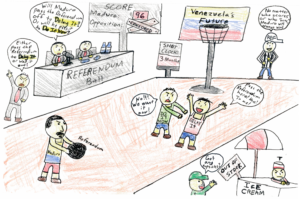Venezuelan Opposition Protests Stringent Referendum Regulations
 On September 26, politicians in Venezuela’s Democratic Unity (MUD) opposition coalition urged supporters to stage demonstrations scheduled for October 12 in response to the National Electoral Council’s (CNE) postponement of the recall referendum. With these demonstrations, the MUD hopes not only to incite support for a recall referendum to oust Maduro, but also to unite the opposition in the face of another obstacle to its effort to remove the Socialist Party, or Chavistas, from power.
On September 26, politicians in Venezuela’s Democratic Unity (MUD) opposition coalition urged supporters to stage demonstrations scheduled for October 12 in response to the National Electoral Council’s (CNE) postponement of the recall referendum. With these demonstrations, the MUD hopes not only to incite support for a recall referendum to oust Maduro, but also to unite the opposition in the face of another obstacle to its effort to remove the Socialist Party, or Chavistas, from power.
On September 22, the CNE, which oversees the referendum process, announced that between October 26 and 28, at least 20% of voters shall express their desire for a referendum by extending signatures in a nation-wide poll. Following this survey, the actual referendum would be held “in the first trimester of 2017.” For the opposition, this decision marks a dismal defeat. Holding the referendum after January 10, at which point Maduro will have completed two years of his presidential term, means that even if Maduro were ousted by the referendum, his vice-president would step into power, and new elections could not be held until 2019.
According to Reuters, the coalition has successfully completed the first phase in triggering a referendum by compiling signatures of 1% of the Venezuelan population. However, the CNE is now mandating that the MUD obtain 20% of voter signatures in each of the country’s 23 provinces. The opposition party contends that, on the contrary, it should be permitted to accumulate 20% signatures nation-wide rather than by each province, and to demand otherwise is “unconstitutional,” as reported by the BBC.
MUD representatives have denounced this mandate as a stalling tactic intended to further delay the referendum, and confidently argue that the Maduro administration is doing everything in its power to prevent the collapse of the longtime socialist regime established by Maduro’s predecessor, Hugo Chavez. Meanwhile, the opposition believes Venezuelans are tired of the economic and political turmoil in their country brought about during Maduro’s regime. According to Euronews, MUD leader Jesus Torrealba declared, “if they [the Venezuelan government] opened the 40,000 polling stations here, to hear the sovereign expression of the will of the people, … we would be calling their resignation.”
Despite the MUD’s proclamation that it maintains popular support amongst the Venezuelan constituency, the CNE argues that fraud may be involved in the referendum process. According to the Buenos Aires Herald, CNE head Tibisay Lucena initiated legal investigations to verify the legitimacy of the referendum signatures, believing that some identities may have been fabricated to provide a boost to MUD petitionary claims. Although the opposition coalition can proceed to the second phase of the referendum for now, government official Jorge Rodriguez has declared the MUD’s efforts as “dead, from a legal standpoint.”
